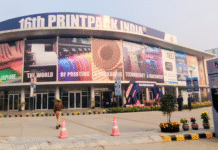Dow India’s breakthrough Ecofast technology received the Golden Peacock Eco-Innovation Award 2020 (GPEIA) by the Institute of Directors. Considered amongst the most prestigious recognitions on product excellence, the award highlights the company’s commitment to innovation, as it works to identify and solve problems facing the world.
Dow India Technology Centre (DITC), a state-of-the-art application development hub that enables collaboration with customers to create sustainable, market-centric products and solutions, played a key role in the development and optimization of Ecofast technology.
Ecofast sustainable textile treatment is a one-of-its-kind solution for textile manufacturing hubs in India and South East Asia, emerging as a top contender for environmentally conscious and driven companies with sustainability goals.
Speaking about this recognition, Chandrakant Nayak, chief executive officer, and country president, Dow India said, “Winning this prestigious citation is a matter of great pride for us and celebrates the hard work of our scientists and engineers in the creation of innovative new products that address customer needs. Ecofast is part of a portfolio of products that drives the company’s sustainability goal.
The Golden Peacock Awards, established by the Institute of Directors, India in 1991, recognize globally competitive approaches and new benchmarks in environment management, eco-innovation, and energy efficiency, among others.
This year, the awards secretariat received 496 applications, of which 235 were shortlisted through a three-tier assessment process. The highest scoring applicants were assessed on an exhaustive set of parameters in their respective industrial sectors and adjudged winners. The jury comprised environment, health & safety, energy and climate change experts under the chairmanship of Justice M. N. Venkatachaliah, former chief justice of India, chairman, National Human Rights Commission of India and National Commission for Constitution of India Reforms.
Ecofast Sustainable Textile Treatment addresses several pressing sustainability challenges of the textiles industry. The conventional dyeing process leaves a high concentration of residue – dye and dissolved salts in the wastewater; this technology provides a zero effluent discharge solution. In addition, Ecofast enhances the performance properties of washing and perspiration fastness by using 90% less process chemicals, including dyes, salt, and other additives. It uses 50% less water with fewer rinses and faster cycle times and 40% less energy with room-temperature dyeing, helping garment brands reduce their carbon footprint. Used in textile manufacturing hubs in India and South East Asia, it has emerged as the natural choice for environmentally conscious and driven companies to meet their sustainability goals.
Dow Chemical International (Dow India) is committed to delivering the right solutions to its customers’ challenges every day. With the broadest technology sets spanning performance materials, industrial intermediates, and plastics, Dow India delivers differentiated science-based products and solutions in high-growth segments, such as packaging, infrastructure, and consumer care.
With approximately 1000 employees, its operations are spread over 7 locations in the country, including three manufacturing sites, three established centers of excellence, and one headquarter office. As a responsible corporate, the company supports its corporate social responsibility (program) with technology expertise and employee volunteerism. Dow India works with non-profit partners towards the empowerment of differently-abled, women and children in communities where it operates. The company aims to redefine societal blueprint by supporting holistic sustainability and circular economy initiatives.














